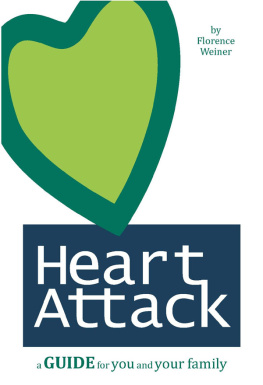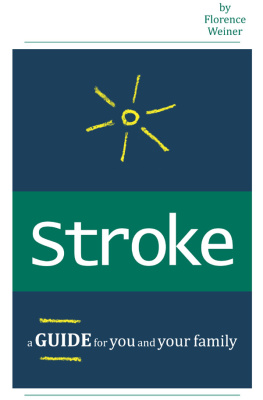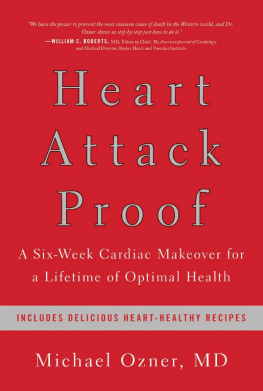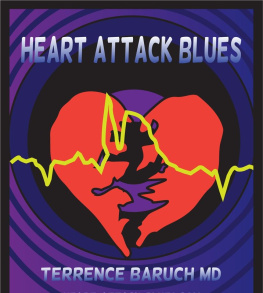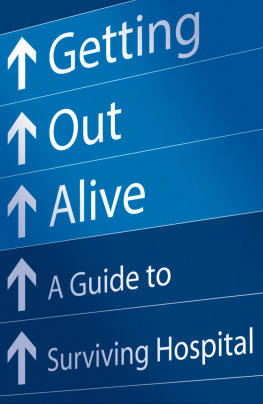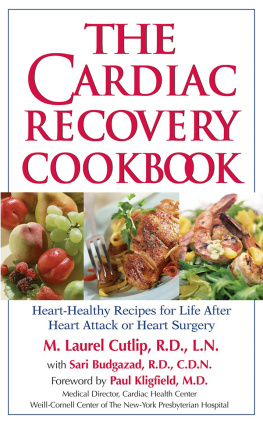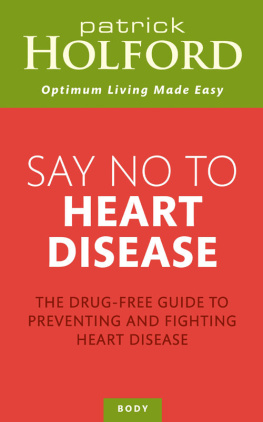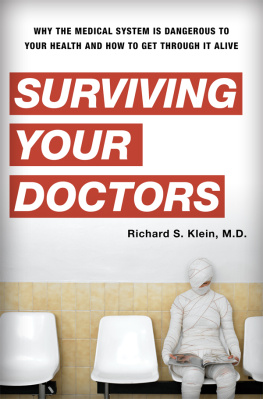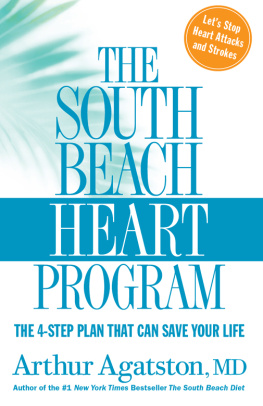
HEART ATTACK A GUIDE FOR YOU AND YOUR FAMILY
A Practical Guide for You and Your Family
By Florence Weiner
TABLE OF CONTENTS
Questions to ask your doctor, nurses, physical therapists, and social workers before leaving the hospital; Help with checking your hospital bills; Services of agencies; Checklist for you and your family.
How to plan your day and create an informal schedule; How to arrange your kitchen, bedroom, and bathroom; A daily schedule a reminder to take your blood pressure, medications, and things to share with your doctor.
First-hand advice: How to save your energy; Strategies for getting up when youre feeling down; About intimacy; What families need to know to prevent injuries; A room-by-room checklist for preventing home accidents.
How to find the best medical care, including ways to communicate effectively and establish a sound partnership with your doctor. Online sites for patients to rate their doctors.
Tips and suggestions from rehabilitation specialists on how to put your program into action, including setting goals and maintaining your program.
How to handle the challenge of returning to work whether to the same job or something new with practical guidelines on finding a balance between work and the other parts of your life, plus tips on coping with job-related stress.
Preventing injuries; recognizing and responding to an emergency, including specific steps to take in an emergency, and guidelines to determining the warning signs of a heart attack.
Online information from experienced travelers with disabilities. Websites that connect you to accessible travel organizations.
Web sites to find community services: personal care aides, physical therapists, social workers, occupation therapists, medical billing professionals and information.
AN INVITATION
Chances are that if you are reading this book, you have been in the hospital because of a heart attack, open-heart surgery or other cardiac problem.
Perhaps you are the wife, husband, daughter, son, or other family member hospitalized with a heart condition and wants to learn more about what it takes to make life work again, and the nature of your role in the recovery process.
Instantly, you can connect with consumers who know first-hand the services and products that are a safe bet and those to steer clear of. They tell you what works and what doesnt. When to buy something, or not and where to buy it at the best price.
This consumer savvy can impact your choices. It can save you time, energy and dollars and may even determine the quality of your life.
Seventeen years ago, with Mathew H.M. Lee, a pioneer rehabilitation physician, and the former Medical Director of Rusk Institute of Rehabilitation Medicine, in New York, I had the privilege of writing two books. Dr. Lee has passed away, but I can imagine his excitement at the myriad changes that have taken place since those pre-Internet days.
I once asked Dr. Lee what the questions that most people asked him. Its always the same ones, he said, whether the person is rich or poor, educated or not when will I be able to be independent again? And what do I have to do to get back to being myself?
If this book is useful in helping you and your family find your way back to living happily, it will have served its purpose well.
How to Make the Most of This Book
Consider using a notebook, loose-leaf binder, or your computer: Organize it according your own personal style. Some people choose to arrange it by subjects, such as their medications, diet, and exercise. Others prefer a daily schedule with appointments and therapy times; or any way that makes it easy to use. When you come across an item in this book or somewhere else that seems especially useful to you, jot it down.
Save and organize your bills: You may want to use a pocket in the loose-leaf binder or a folder, to organize your bills into two categories: Paid and Unpaid. Keep receipts from any health care-related purchases, also contracts from home care agencies and suppliers, pertinent letters, and anything else that is important to save for your own records or for insurance and tax purposes.
Create a separate list of phone numbers. Keep a lot of your doctors, personal care attendants, your insurance policy numbers, and anything else you want to have handy.
CHAPTER ONE: Leaving the Hospital
Discovering the ways in which you are exceptional, the particular path you are meant to follow, is your business on this earth, whether you are afflicted or not. Its just that the search takes on a special urgency when you realize that you are mortal.Bernie Siegel, M.D.
Tips for You and Your Family
Leaving the hospital after a heart attack reminded Marty Templer of his experience of graduating from school. It had the same feelings of excitement, anticipation and anxiety, he told me, and like the challenge of any new situation, the best way to take control of it is through action.
Templer, 57, a landscaper from Red Bank, New Jersey, whose heart attack came as a complete surprise, asked his brother to help him prepare for what to expect when he got home. He showed up for every meeting with my doctors, nurses, even the physical therapist, and he wrote down their answers to my questions on 3 x 5 cards, and then handed them to me when I got home.
Choose someone, perhaps a family member or friend to serve as your hospital advocate. Ask your advocate to sit in on the talks you have with your doctor: have them there when you meet with the physical therapist. If you have had surgery, the nurses can give you and your advocate as well as the rest of your family or other helpers instructions about the postoperative care that you will need.
An advocate can call to make an appointment with the social services department, especially if you are going to ask them to make arrangements for a personal care aide or a nurse.
Most hospitals also have staff members who serve as patient representatives and can be very helpful in answering your questions.
Men and women who have left the hospital after a heart attack or bypass surgery say that if you dont get answers to all of your questions for example, questions about your medication, exercise, and symptoms to report to your doctor while in the hospital, you can continue when you are at home, and during your next visit with your doctor.
Your family, too, should think about the kind of information they will need to best care for you and help in your recovery. But no matter when or where you ask your questions, remember: Go slowly. Think about what you want to say to your doctors, the nurses, or others on the staff about information that may be useful.
Below are some examples of the type of information the hospital staff can give you. If possible, these discussions should include you, your advocate, and another member of your family. Make sure that someone is appointed the official note-taker.
If you are not given a written hospital discharge plan, ask for one. Hospital discharge plans vary but usually include a description of your condition, a list of all medications with complete instructions on their use, a diet, an exercise plan, a restricted-activities list, and, if needed, prescriptions for home nursing and physical therapy.
Discuss with the appropriate doctors and nurses your most pressing problems. It helps to write down your questions in advance and then record the answers you get. You will probably have more questions after you leave the hospital. When they occur to you, write them down and ask them when you next see your doctor.
Next page
